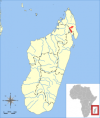

Silky sifakas only inhabit 90,000 hectares (or 350 square miles) of protected area in the rain-forests of northeastern Madagascar. The silky population faces a variety of threats from being hunted for bush-meat, to habitat loss from slash-and-burn farming and deforestation.
The size of the silky sifaki population is unknown. Erik Patel, a PhD candidate from Cornwell University who has spent years observing the lemurs, estimates there are fewer than 100 to 1,000 silky sifakas remaining. Female silkies are only fertile one day a year, and give birth once every two years, making it very difficult to rebuild the population.

After a political coup devastated Madagascar in 2009, its national forests were no longer protected. The two largest protected habitats of the silky sifaki, Masoala National Park and Marojejy National Park, have been the hardest hit. Both areas have suffered from villagers burning down forests to make way for rice fields and illegal logging; causing silky sifaka numbers to plummet.

After word of illegal logging spread the U.S. Environmental Investigation Agency took action to track timber exports. Companies who bought illegal Madagascan precious hardwoods, like the Gibson Guitar Corporation, now face prosecution.
If efforts can continue to be made to save their habitat, the silky sifakas might live to avoid the fate of their nickname.
For More:
View a BBC slideshow about the fight to save Silky Sifakas
Learn more about Silky Sifakas here.
Photos courtesy of Jeff Gibbs, Wikimedia user Chermundy and the IUCN Red List, Erik Patel via Wikicommons, and Flickr member muzzanese